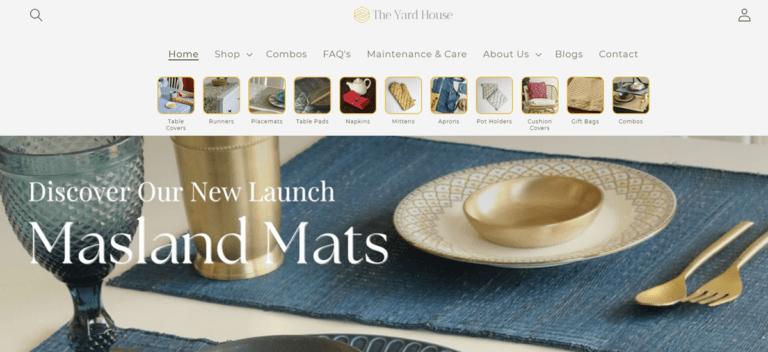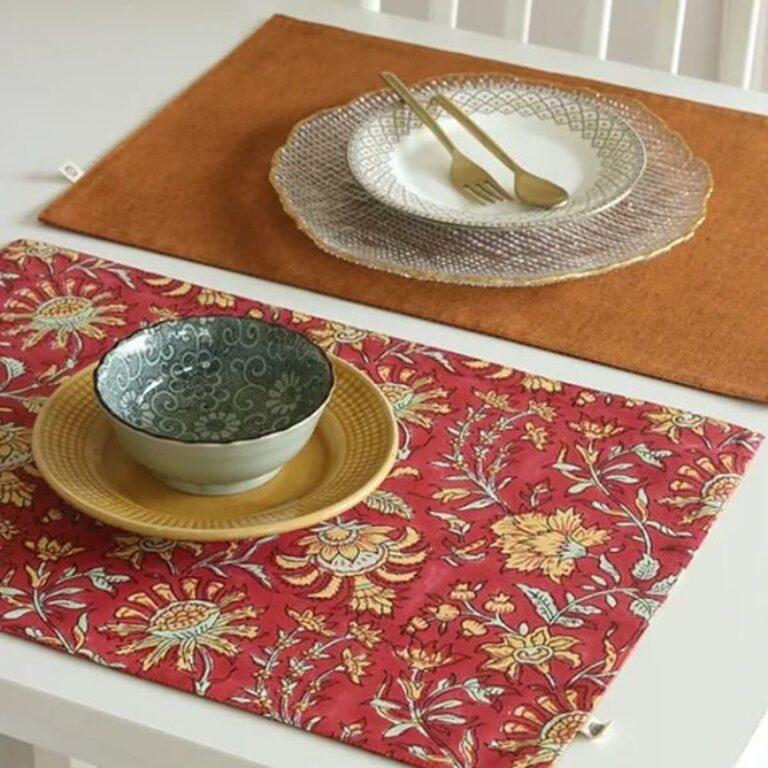One fine evening, you are enjoying chai, pakodas with ketchup and kairi ki chutney. Mouthwatering! 😋
Suddenly, the ketchup bowl spills and here you go, a new stain to get rid of from the tablecloth.
Argh! 😡
I know, it can be irritating and Indira Prashant was facing the same situation. Just as us, she also got tired and accepted: regular stains, scratches, and thinning cloth from constant washing.
It was 2020—yes, again the year of the lockdown—when Indira got an idea that there should be a tablecloth that could withstand daily struggles and remain elegant.
And this simple idea led to something different. In 2020, Indira Prashant laid the foundation of The Yard House to provide India’s 1st wipeable, plastic-free, and anti-slip cotton tablecloths.
Presently, its consumer base has crossed 10,000 homes and sold 30,000+ products since it was established.
But How Did an Idea Turned into a Startup?
Indira Prashant has a background in Chemical Engineering from BITS Pilani, along with an MBA. Later, she worked in the marketing department with Colgate-Palmolive and Flipkart.
In 2012, she took a break from her career to raise her two daughters. However, a couple of years later, she started discovering her interest in home decor. And her keen eye was the reason she was able to pay attention to the table linen idea and concept.
The Eureka Moment
Using fabric softener for mattresses is a common practice and while doing so Indira asked herself: why are we not doing the same with table linen to maintain its quality and color?
This is when the hard part of the journey began. After all, it was not easy to create a wipeable cloth made from cotton, and that too should be anti-slip.
Soch ke hi me to thak gai bhaishab! 😪
But Indira was determined to make one. She visited various manufacturers with her idea but mostly faced back-to-back rejection.
The journey to creating the perfect wipeable, anti-slip tablecloth was far from easy. Indira faced rejection after rejection. “Everyone said no. Manufacturers weren’t convinced the idea was viable,” she recalls.
Majorly, they weren’t convinced ki aisa kuch bhi ban sakta hai. Yes, this happens, agar market me kuch nahi hai, ya shopkeeper ne nahi suna, to wo saman exist hi nahi kar sakte. If you know, you know. 🤷🏼♂️

Taking a Different Path
Eventually, she decided to focus on research and met with textile experts at Anna University. She also visited factories across Tamil Nadu and Gurugram and explored chemical finishes.
She just wanted to turn her idea into a product. And after 500 days, finally, 2 block printers from Jaipur agreed to try her approach. They worked on prototypes and the 11th prototype turned out to be the desired one.
It was soft as cotton was spill-resistant and retained an anti-slip feature. 🙌🏼
Turning the Tough Times into an Opportunity
While the pandemic and lockdown were not helping other big brands, with factories shutting down and all, international orders were reducing.
Launching a new brand at that time was a matter of high risk, but Indira turned it into an opportunity.
With little to no work, manufacturers got ready to try her idea and her 1st collection was of 35 pieces with 7 prints. 5 pieces of each print.
Spreading the word: The Power of Social Media
During that time, she created a website, reached out to her friends on Instagram and spread the word about her products.
Within an hour, she received her 1st order, and within days the entire collection of 35 pieces was sold out.
But Why is The Yard House Different from Other Textile Brands?
The thoughtfulness and the practicality behind its creation. Founder Indira’s vision was clear about her brand; she wanted to honor India’s cultural heritage through prints and fabric.
- The brand sources fabric from Surat and Erode.
- Block printing is done in Jaipur.
- Then the treatment to make the fabric wipeable takes place in Tamil Nadu.
- Finally, the finished product arrives in Bengaluru at the brand’s headquarters.
Wow, the fabric itself is travelling across 3 Indian states before it finally reaches our home.
No Fundings, No Investments, Yet Thriving
The Yard House was bootstrapped and Indira’s mother became her partner in running the business, which from day 1 has turned out to be profitable. 👏🏼
In FY24-25, the company’s revenue is close to Rs 3 crore, with 65% of sales from its website and the remaining 35% from Amazon.
Based on their product quality, it is not surprising to note that customers have, till now, spent around 65,000 on the tablecloths.
Challenges and Solutions
To begin with, block printing presents unique challenges.
Finding Precision and Quality in Block Printing
Jaipur’s artisans have an unparalleled level of skill and precision. However, Indira tried finding block printers in Tamil Nadu, but their work couldn’t match the quality of those from Jaipur. Thus, they have to send the product to Jaipur.
Weather-Dependent Process
Since block printing is a slow, handmade, and weather-dependent process, it slows down the entire production cycle.
However, with the growing demand for the products, Indira has to come up with a solution. Thus, she decided to introduce screen printing and woven solid fabrics without compromising traditional craftsmanship.
Finding the right balance between design and functionality turned out to be the biggest challenge.
Obviously, Indians and their love for turmeric (haldi) and pickles (achaar) is widespread. Plus, kids and chocolates, adults and wine/coffee. Although all these stains wipe off somehow, the turmeric stain is the most stubborn.
To solve the problem, the team tried laminating the fabric but again it means involving plastic, and it won’t go with the mission (plastic-free and breathable cloth).
After multiple attempts and experiments, the company decided to educate customers about selecting the right product on the basis of the type and amount of spills their tablecloth would bear.
Overall, while prioritizing design and color selection, Indira has applied for patents for her design. Simple, to avoid getting their designs copied and all.
What’s Next?

It is appreciable that what started as a home project transformed into a business with Indira’s determination. Today, the startup with a team of 7 women works with 5 partners, each of them employing around 70 artisans. Its bestsellers are reversible placemats and tablecloths.
For their next move, the brand is planning to expand internationally by the end of 2025. Indira is also planning to expand her products range by adding bedding, screens, and more.
As The Yard House grows, Indira prioritizes quality, design, and sustainability with wipeable tablecloths. Brand’s upcoming summer collaborations and designs are a demonstration of the power of believing in an idea, even when others don’t.
You can shop @The Yard House
Follow their story @The Yard House




